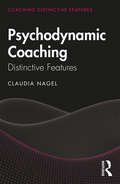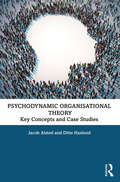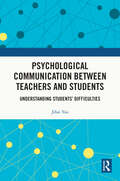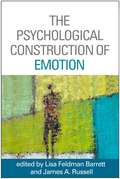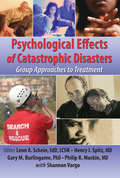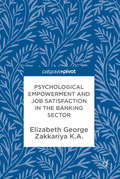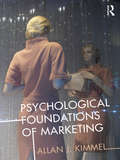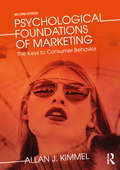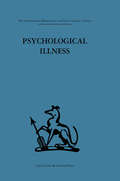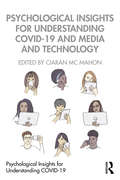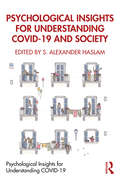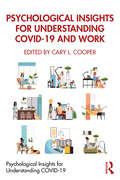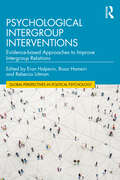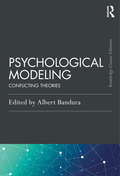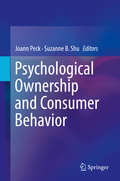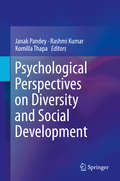- Table View
- List View
Psychodynamic Coaching and Supervision for Executives: An Entrepreneur and a Psychoanalyst in Dialogue
by Andreas Hamburger Thomas KretschmarThomas Kretschmar and Andreas Hamburger provide an important overview of psychodynamic work in companies, presenting different viewpoints and explaining key psychoanalytic terms and techniques for coaching and supervision. Written in the form of a dialog between Kretschmar, an entrepreneur, and Hamburger, a psychoanalyst, the book provides unique insight into psychodynamic coaching and supervision. Psychodynamic Coaching and Supervision for Executives begins with an overview of coaching, psychodynamic approaches, the unconscious and relevant psychoanalytic theory. Kretschmar and Hamburger then consider Operationalized Psychodynamic Diagnosis (OPD) in business, assess current research into coaching and supervision and present a selection of key case studies. At the end of each chapter, the authors compare their positions, giving important contextual information, exploring objections, complications and improvements, and providing a precise summary of the topic. This book will be an illuminating guide for therapists and professionals who wish to learn how psychoanalytic theory and practice can be used for coaching, counseling and supervision in an organizational context.
Psychodynamic Coaching: Distinctive Features (Coaching Distinctive Features)
by Claudia NagelIn Psychodynamic Coaching: Distinctive Features, Claudia Nagel presents a comprehensive overview of the unique features of psychodynamic coaching. As leaders and managers acknowledge the need to understand themselves and their context by looking underneath the surface to improve their decision-making, psychodynamic approaches offer unique insight. Psychodynamic Coaching: Distinctive Features covers not only the major theory but also the practice of coaching, giving guidance from beginning to end of the client relationship. Constructive, holistic and accessible, it demonstrates the impact and dynamics of the unconscious whilst illustrating the power of understanding human behaviour in the complexity of the modern world. With a focus on emotions and relationships in supporting modern leaders adapting to organsational challenges, this book will be an invaluable tool for coaches of all backgrounds, academics and students of coaching and organisational behaviour, and also clinicians. It will also be a key resource for senior leaders for their own personal growth.
Psychodynamic Organisational Theory: Key Concepts and Case Studies
by Jacob Alsted Ditte HaslundOn the surface, people go to work and come home again. They sometimes manage people while most are managed themselves. But beneath the function and structures of the work itself, a whole range of emotions affects the success of the relationship between employee and manager and ultimately the organisation they both belong to. Psychodynamic Organisational Theory: Key Concepts and Cases provides a comprehensive but accessible introduction to this fascinating field of study. Featuring case vignettes which bring the various concepts to life, the book is divided into four parts. Part I looks at how the individual relates to the organisation and the unconscious energies they bring, while Part II examines group dynamics and how they affect productivity, including a chapter on meetings. Part III explores the realm of leadership and what roles a manager can play in managing their staff, while Part IV introduces the idea of personality and describes how the manager’s personality influences management dynamics as well as the wider organisational culture. Central to the book, as well as the idea that organisational phenomena are often unconscious, is the understanding that relationships are always reciprocal. Through complex psychological dynamics manager and employee influence and change each other during the process of managing and being managed. This text will be essential reading for students and scholars of leadership, HRM, and organizational psychology, as well as consultants and managers looking for practical insights into how human relationships affect the success of every organisation.
Psychodynamisches Coaching für Führungskräfte: Einzel- und Gruppencoachings in Theorie und Praxis (essentials)
by Beate West-Leuer Marga Löwer-HirschDieses essential bietet Einblicke in die Praxis des psychodynamischen Leadership-Coaching, welche gestützt werden durch authentische Beispiele aus der Beratungspraxis der Autorinnen. Die Kernkompetenzen des Führens werden von unbewussten Dynamiken gesteuert. In der Beziehung zum Coach können diese entdeckt und integriert werden. Der innere Handlungsspielraum erweitert sich, sowohl im psychodynamischen Einzel- wie auch im Gruppencoaching auf je unterschiedliche Weise.
Psychogeography and Psychology: In and Beyond the Discipline (Concepts for Critical Psychology)
by Alex J. BridgerPsychogeography usually refers to radical and artistic ways of walking or to a conflation of psychology with geography. In this unique work, the author makes arguments for considering psychogeography as a way to critique the contemporary world and to consider new ways of studying the interface of human beings in environments. The book begins by introducing and explaining the term psychogeography from a range of academic, activist, and artistic perspectives. Each chapter presents different approaches to doing psychogeography and there are arguments presented for why there is a need for a postpsychology. The author takes a creative and innovative approach to psychogeography by extending walking methods of research to include other forms of practice and research including playwriting and wargaming. The only book written on psychogeography from a psychological perspective, this book will appeal to researchers and students of psychology, geography, architecture, and cultural studies as well as artists, activists, and the public.
Psychological Communication Between Teachers and Students: Understanding Students’ Difficulties
by Jihai YaoPsychological communication between teachers and students is the essence of formal education. This book focuses not only on analyzing problems from the perspective of teachers but also from the perspective of students and provides educators with ways to communicate effectively with their students.It is necessary for teachers to be concerned with cultivating and stimulating the internal motivation of students’ development. This book discusses the significance of psychological communication and effective communication between teachers and students, the psychological preconditions of communication between them and strategies that teachers can utilize to communicate more effectively with their students. In addition, the author provides a large number of cases, psychological tests and exercises to help teachers have a better understanding of themselves, their students and to find more effective working methods, while establishing a democratic, equal and harmonious interpersonal relationship between them.Communication between teachers and students is an essential and indispensable component during the process of teaching and learning. This book thus will be of interest to teachers, students, and researchers of educational psychology, education management and those who are interested in teachers' professional development in general.
Psychological Conflict Management: Professional Tools for Specialists and Managers (essentials)
by Werner Schienle Andreas SteinbornDo you want to handle conflicts (even) better? Do you want to know how to assert your interests without leaving a trail of broken relationships with colleagues, superiors, employees, or even in your social and friend circles? Here, you will find the answers. In this second edition of the essentials, which has already established itself as a standard work in its first edition, you will not only find a wealth of practical and easily applicable tools for everyday use, but you will also gain valuable insights into human thought and perception processes that promote conflict. Considering these insights will make your life much easier. Less petty conflicts, and more time and energy for your actual tasks.
Psychological Construction of Emotion
by James A. Russell Lisa Feldman BarrettThis volume presents cutting-edge theory and research on emotions as constructed events rather than fixed, essential entities. It provides a thorough introduction to the assumptions, hypotheses, and scientific methods that embody psychological constructionist approaches. Leading scholars examine the neurobiological, cognitive/perceptual, and social processes that give rise to the experiences Western cultures call sadness, anger, fear, and so on. The book explores such compelling questions as how the brain creates emotional experiences, whether the "ingredients" of emotions also give rise to other mental states, and how to define what is or is not an emotion. Introductory and concluding chapters by the editors identify key themes and controversies and compare psychological construction to other theories of emotion.
Psychological Effects of Catastrophic Disasters: Group Approaches to Treatment
by Philip R. Muskin Joseph Rose Henry I Spitz Leon Schein Gary BurlingameA thorough, user-friendly guide of basic knowledge and group interventions for psychological trauma from terrorist attacks and other catastrophic disastersThere is relatively little literature on the psychological trauma caused by catastrophic disasters, including terrorist attacks and the impending threats of terrorism. Psychological Effects of Catastrophic Disasters: Group Approaches to Treatment fills that gap by comprehensively discussing ways to minimize the psychological damage resulting from catastrophic disasters as well as the trauma developed from the threat of future terrorist attacks. The book provides thorough presentations of almost manualized group methods for the prevention and treatment of the acute and longer-term psychological effects for children, adolescents, and adults.Appropriate treatment immediately after a catastrophe can diminish harmful psychological effects, enhance an individual&’s quality of life, decrease psychosomatic illnesses and the exacerbation of chronic medical conditions, increase the effective utilization of medical facilities, and decrease medical expenses. In this book, internationally renowned authorities provide practical expert suggestions and helpful examples to illustrate the interventions and provide a quick reference for professionals facing the aftermath of prospective terrorist disasters and other catastrophic events. Psychological Effects of Catastrophic Disasters: Group Approaches to Treatment is divided into four sections. The first section provides an overview of the book; the second discusses the foundations and broad issues which potentially affect the outcome of group treatment; the third section presents group models which address the particular needs of children, adolescents, parents, emergency service personnel, and mental health practitioners; and the fourth part considers future directions of treatment. Designed to be used as a comprehensive single source for professionals working with victims of trauma caused by terrorism or catastrophic disaster, this book can be read and used in its entirety, or specific chapters detailing treatments can be chosen and used independently as needed. Extensive references allow opportunities for further research.Psychological Effects of Catastrophic Disasters: Group Approaches to Treatment presents unique first-person accounts of September 11th and examines: the neurobiological effects of a traumatic disaster the effective use of psychotropic medication the implications of living with ongoing terrorist threats a new framework for preparedness and response to disasters and trauma for children and families cultural, religious, and ethnic differences related to the prevention and treatment of psychological sequelae the diagnosis and treatment of traumatic grief retraumatization, distressing reminders, and their effects on post-traumatic adjustment the knowledge trauma therapists need to integrate small group principles the diagnosis and group treatment of acute and long-term effects with adults and children the use of spiritual principles after a terrorist disaster or catastrophic event nine types of groups appropriate for specific populationsPsychological Effects of Catastrophic Disasters: Group Approaches to Treatment is a timely, comprehensive reference for social workers, psychologists, psychiatrists, health professionals, mental health professionals, educators, and students.The royalties from this book shall be donated to organizations which provide direct services to those who continue to be affected by the events of September 11th, 2001 and Hurricane Katrina (August 29th, 2005).
Psychological Empowerment and Job Satisfaction in the Banking Sector
by Elizabeth George Zakkariya K. A.This book explores how psychological empowerment can influence and enhance job satisfaction. The authors argue that in today’s working climate the wellbeing and involvement of employees is of utmost importance to any company’s overall success and that management techniques like empowerment are the most effective means of achieving this goal. Based on an empirical study examining job satisfaction amongst employees of several private sector, public sector and new generation banks in Kerala, India as well as extensive literature review, this book discusses the role psychological empowerment plays in enhancing job satisfaction both locally and internationally. It goes on to analyze four dimensions of psychological empowerment and the role of job satisfaction in the relationship between psychological empowerment and job related stress. This book will be of great interest to scholars in management and psychology and is essential reading for industrialists and managers wanting to apply empowerment strategies in their own workplace.
Psychological Foundations of Marketing
by Allan J. KimmelA CHOICE Outstanding Academic Title 2013! Are we influenced by ads even when we fast-forward them? Do brands extend our personalities? Why do we spend more when we pay with a credit card? Psychological Foundations of Marketing considers the impact of psychology on marketing practice and research, and highlights the applied aspects of psychological research in the marketplace. This book presents an introduction to both areas, and provides a survey of the various contributions that psychology has made to the field of marketing. Each chapter considers a key topic within psychology, outlines the main theories, and presents various practical applications of the research. Topics covered include: Motivation: The human needs at the root of many consumer behaviors and marketing decisions. Perception: The nature of perceptual selection, attention and organization and how these perceptual processes relate to the evolving marketing landscape. Decision making: How and under what circumstances it is possible to predict consumer choices, attitudes and persuasion? Personality and lifestyle: How insight into consumer personality can be used to formulate marketing plans. Social behavior: The powerful role of social influence on consumption. This book will be of great interest to a diverse audience of academics, students and professionals, and will be essential reading for courses in marketing, psychology, consumer behavior and advertising.
Psychological Foundations of Marketing: The Keys to Consumer Behavior
by Allan J KimmelThis is the only textbook to provide an applied, critical introduction to the role of psychology in marketing, branding and consumer behavior. Ideally suited for both students and professionals, the new edition is a complete primer on how psychology informs and explains marketing strategies, and how consumers respond to them. The book provides comprehensive coverage of: Motivation: the human needs at the root of many consumer behaviors and marketing decisions. Perception: the nature of perceptual selection, attention, and organization and how they relate to the evolving marketing landscape. Decision making: how and under what circumstances it is possible to predict consumer choices, attitudes, and persuasion. Personality and lifestyle: how insight into consumer personality can be used to formulate marketing plans. Social behavior: the powerful role of social influence on consumption. Now featuring case studies throughout to highlight how psychological research can be applied in the marketplace, and insightful analysis of the role of digital media and new technologies, this award-winning textbook is required reading for anyone interested in this fascinating and evolving subject.
Psychological Illness: A community study
by E J R PrimroseTavistock Press was established as a co-operative venture between the Tavistock Institute and Routledge & Kegan Paul (RKP) in the 1950s to produce a series of major contributions across the social sciences. This volume is part of a 2001 reissue of a selection of those important works which have since gone out of print, or are difficult to locate. Published by Routledge, 112 volumes in total are being brought together under the name The International Behavioural and Social Sciences Library: Classics from the Tavistock Press. Reproduced here in facsimile, this volume was originally published in 1962 and is available individually. The collection is also available in a number of themed mini-sets of between 5 and 13 volumes, or as a complete collection.
Psychological Insights for Understanding COVID-19 and Media and Technology (Psychological Insights for Understanding COVID-19)
by Ciarán Mc MahonIn the Psychological Insights for Understanding COVID-19 series, international experts introduce important themes in psychological science that engage with people’s unprecedented experience of the pandemic, drawing together chapters as they originally appeared before COVID-19 descended on the world. This book explores how COVID-19 has impacted our relationship with media and technology, and chapters examine a range of topics including fake news, social media, conspiracy theories, belonging, online emotional lives and relationship formation, and identity. It shows the benefits media and technology can have in relation to coping with crises and navigating challenging situations, whilst also examining the potential pitfalls that emerge due to our increasing reliance on them. In a world where the cyberpsychological space is constantly developing, this volume exposes the complexities surrounding the interaction of human psychology with media and technology, and reflects on what this might look like in the future. Featuring theory and research on key topics germane to the global pandemic, the Psychological Insights for Understanding COVID-19 series offers thought-provoking reading for professionals, students, academics and policy makers concerned with the psychological consequences of COVID-19 for individuals, families and society.
Psychological Insights for Understanding COVID-19 and Society (Psychological Insights for Understanding COVID-19)
by S. Alexander HaslamIn the Psychological Insights for Understanding COVID-19 series, international experts introduce important themes in psychological science that engage with people’s unprecedented experience of the pandemic, drawing together chapters as they originally appeared before COVID-19 descended on the world. This book explores how COVID-19 has impacted society, and chapters examine a range of societal issues including leadership and politics, community, social status, welfare, social exclusion and accountability. Addressing the social and psychological processes that structure, and are structured by, our social contexts, it shows not only how groups and individuals can come together to manage global crises, but also how these crises can expose weaknesses in our society. The volume also reflects on how we can work together to rebuild society in the aftermath of the pandemic, by cultivating a shared sense of responsibility through social integration and responsible leadership. Showcasing theory and research on key topics germane to the global pandemic, the Psychological Insights for Understanding COVID-19 series offers thought-provoking reading for professionals, students, academics and policy makers concerned with the psychological consequences of COVID-19 for individuals, families and society.
Psychological Insights for Understanding COVID-19 and Work (Psychological Insights for Understanding COVID-19)
by Cary L. CooperIn the Psychological Insights for Understanding COVID-19 series, international experts introduce important themes in psychological science that engage with people’s unprecedented experience of the pandemic, drawing together chapters as they originally appeared before COVID-19 descended on the world. This timely and accessible book brings together a selection of chapters offering insights into issues surrounding work and the COVID-19 pandemic. Featuring content on topics such as health and wellbeing, work-family, flexible hours, organisational communication, talent management, recovery from work, employee engagement and flourishing, burnout, and organisational interventions, the book includes a specially written introduction contextualising the chapters in relation to the COVID-19 crisis. Reflecting on how psychological research is relevant during a significant global event, the introduction examines the potential future impact of the pandemic on the practice and study of psychology and our lives more generally. Featuring theory and research on key topics germane to the global pandemic, the Psychological Insights for Understanding COVID-19 series offers thought-provoking reading for professionals, students, academics and policy makers concerned with the psychological consequences of COVID-19 for individuals, families and society.
Psychological Insights on the Role and Impact of the Media During the Pandemic: Lessons from COVID-19
by Barrie GunterThis volume places the spotlight on the role different media and communications systems played in informing the public about the pandemic, shaping their views about what was happening and contributing to behavioural compliances with pandemic-related restrictions. Throughout the pandemic, media coverage has played an important role in drawing attention to specific messages, influencing public risk perceptions and fear responses. Mainstream media and other electronic communication systems such as Facebook and WhatsApp have been pivotal in getting pandemic information out to the public, thereby influencing their beliefs, attitudes and behaviour and engaging them generally in the pandemic as stakeholders. In this timely volume, author Barrie Gunter considers how people reacted to this coverage and its contribution to their understanding of what was going on, including the influence of fake news and misinformation on public beliefs about the pandemic, from anti-lockdown protests to the "anti-vaxx" movement. In addition, looking at how government messaging was not always consistent or clear and how different authorities were found not always to be in harmony or compliance with the messages they put out, Gunter examines the harm done by presenting different publics with ambiguous or conflicting narratives. Drawing out important communications strategy lessons to be learned for the future, this is essential reading for students and researchers in psychology, public health and medical sciences and for policymakers who assess government strategies, responses and performance.
Psychological Intergroup Interventions: Evidence-based Approaches to Improve Intergroup Relations (Global Perspectives in Political Psychology)
by Eran Halperin Boaz Hameiri Rebecca LittmanThis book introduces a comprehensive and integrative collection of psychological intergroup interventions. These evidence-based interventions are scientifically established and tested in several real-world contexts of intergroup animosities and tensions, from prejudice and inequality reduction to peace promotion. Intergroup hostility, violence, and discrimination have become more and more prevalent in recent decades. To address this challenge, recently, social scientists have shown an increasing shift from a descriptive to a more interventionist science, developing evidence-based interventions to improve intergroup relations. For the first time, this book includes research on intergroup interventions and their applications to the field, from a global collection of leading voices in the discipline. It also includes a conceptualization of intergroup interventions, a typology of different types of interventions, as well as a guideline for effective development of intergroup interventions. Each chapter focuses on one psychological intergroup intervention, further reviewing a sample of relevant platforms such as education, entertainment, and VR, upon which psychological intergroup interventions can be implemented. With each chapter featuring both intervention research and practical advice for practitioners, this is the ideal companion for researchers and professionals in social psychology, sociology, politics, peace studies and conflict resolution. It will also be of interest to practitioners looking for practical advice to create an impact in the real-world.
Psychological Knowledge and Practices in Brazilian Colonial Culture (Latin American Voices)
by Marina MassimiThis book examines the complexities of the colonization of the territory that is now Brazil and its shaping of psychological knowledge and practice. It reveals the rich network of cultural practices that were formed through the appropriation of elements of Jesuit Catholicism and the blending with elements of the cultures of native, African and Lusitanian populations present in the territory, and how psychological concepts and practices emerged and circulated between the sixteenth and the late eighteenth centuries, long before the establishment of psychology as a modern science. The volume summarizes the research program developed by the author over 38 years of academic activity through which she contributed to expand the field of historical studies in psychology by investigating how psychological concepts and practices were produced in cultural and historical contexts different from the European and North American societies where scientific psychology developed in the 19th and 20th centuries. Psychological Knowledge and Practices in Brazilian Colonial Culture will be of interest not only to historians of psychology, but also to professional psychologists working with culturally diverse populations who seek to understand how psychological concepts and phenomena are shaped by culture. By doing so, the book intends to contribute to the development of a psychology better prepared to deal with cultural diversity in an increasingly multicultural world. “Massimi’s book will now form an important foundation of English-language scholarship about the psychological and cultural impact of colonization on subjugated peoples. She has, of course, made many such contributions in Portuguese. It is to be hoped that much of her work will be translated into English so that more scholars may benefit from the richness of her insights.” – Excerpt from the Foreword by Dr. Wade E. Pickren.
Psychological Metaphysics (Psychology Library Editions: Perception #33)
by Peter A. WhiteThe research literature on causal attribution and social cognition generally consists of many fascinating but fragmented and superficial phenomena. These can only be understood as an organised whole by elucidating the fundamental psychological assumptions on which they depend. Originally published in 1993, Psychological Metaphysics is an exploration of the most basic and important assumptions in the psychological construction of reality, with the aim of showing what they are, how they originate, and what they are there for. Peter A. White proposes that people basically understand causation in terms of stable, specific powers of things operating to produce effects under suitable conditions. This underpins an analysis of people’s understanding of causal processes in the physical word and of human action, which makes a radical break with the Heiderian tradition. Psychological Metaphysics suggests that causal attribution is in the service of the person’s practical concerns and any interest in accuracy or understanding is subservient to this. A notion of regularity in the world is of no more than minor importance in causal attribution, and social cognition is not so much a matter of cognitive mechanisms or processes but more of cultural ways of thinking imposed upon tacit, unquestioned, universal assumptions. Psychological Metaphysics incorporates not only research and theory in social cognition and developmental psychology, but also philosophy and the history of ideas. It will be challenging to everyone interested in how we try to understand the world.
Psychological Modeling: Conflicting Theories (Psychology Press & Routledge Classic Editions)
by Albert BanduraThe Classic Edition of this key text highlights seminal work done in the subject of learning by modeling and offers an extensive review of the major theories, edited by one of the most influential psychologists of his generation. In his introductory essay, Bandura identifies the most important controversial issues in the field of observational learning and reviews a large body of research findings, before carefully chosen articles, written by a team of expert contributors, tackle a range of key debates in the field. Topics explored include the role of reinforcement play in observational learning, the scope of modeling influences, the types of people most susceptible to modeling influences, and the relative effectiveness of models presented in live action, in pictorial presentations, or through verbal description. Written in a lively and engaging manner, this book will be of interest to all psychology students interested in psychological modeling, as well as educators and professionals working with children.
Psychological Ownership and Consumer Behavior
by Joann Peck Suzanne B. ShuThis pathbreaking volume expands on the construct of psychological ownership, placing it in the contexts of both individual consumer behavior and the wider decision-making of consumer populations. An individual’s feeling of ownership toward a target represents the perception that something is “mine!”, and is highly relevant to buying and relating to specific goods, economic and health decision-making and, especially salient given today’s privacy concerns, psychological ownership of digital content and personal data. Experts analyze the social conditions and cognitive processes concerning shared consumer experiences and psychological ownership. Contributors also discuss possibilities for socially responsible forms of psychological ownership using examples from environmental causes, and the behavioral mechanisms involved when psychological ownership becomes problematic, as in cases of hoarding. Included among the topics: Evidence from young children suggesting that even legal ownership is fundamentally psychological. Ownership, the extended self, and the extended object. Psychological ownership in financial decisions. The intersection of ownership and design. Can consumers perceive collective psychological ownership of an organization? Whose experience is it, anyway? Psychological ownership and enjoyment of shared experiences. Psychological ownership as a facilitator of sustainable behaviors including stewardship. Future research avenues in psychological ownership. Psychological Ownership and Consumer Behavior pinpoints research topics and real-world issues that will define the field in the coming years. It will be especially useful in graduate classes in marketing, consumer behavior, policy interventions, and business psychology.
Psychological Perspectives on Diversity and Social Development
by Janak Pandey Rashmi Kumar Komilla ThapaThis book is a collection of essays covering a range of issues related to socioeconomic inequalities and diversities. The authors, leading social scientists of diverse nationalities, represent varied perspectives. The book has essays on multiculturalism, social inclusion and exclusion of minorities and other marginalized groups such as low castes, linguistic minorities, Adivasis (tribals), persons with disability and unemployed youth. The book focuses on some innovative concepts considered necessary to understand the very process and evolution of aspects of social development such as pro-sociality, authentic responsible self and leadership ideology. The book deals with the challenges for achieving social development and societal harmony. The book will be a very useful resource for social science scholars and particularly for social and cultural psychologists, development professionals and administrators interested in the issues related to social development, social diversity and inter-group relations. The book will also be useful for policy formulation and action.
Psychological Perspectives on Financial Decision Making
by Tomasz Zaleskiewicz Jakub TraczykThis book reviews the latest research from psychology, neuroscience, and behavioral economics evaluating how people make financial choices in real-life circumstances. The volume is divided into three sections investigating financial decision making at the level of the brain, the level of an individual decision maker, and the level of the society, concluding with a discussion of the implications for further research. Among the topics discussed:Neural and hormonal bases of financial decision makingPersonality, cognitive abilities, emotions, and financial decisionsAging and financial decision makingCoping methods for making financial choices under uncertaintyStock market crashes and market bubblesPsychological perspectives on borrowing, paying taxes, gambling, and charitable giving Psychological Perspectives on Financial Decision Making is a useful reference for researchers both in and outside of psychology, including decision-making experts, consumer psychologists, and behavioral economists.
Psychological Perspectives on Identity, Religion and Well-Being: Empirical Findings from India
by Girishwar Misra Preeti Kapur Nitin K. VermaThis book takes a social psychological perspective to study the ways in which identity, religious beliefs and well-being are related to and affect each other in the contemporary world. It simultaneously draws upon intellectual resources from the extant interdisciplinary literature to build connections within the broader societal context. In view of the social diversity and changes in post-globalization India, issues of identity, religion and well-being emerge as dynamic and vibrant aspects of social reality in both individual and group contexts, across age groups and genders. The current social-cultural-political scenario in the India, therefore, points to the need to investigate the outcome of personal and social well-being in relation to identity and religion. As contexts change, these issues take different shades and influence human conditions differentially. This book undertakes the investigation by going beyond the traditional tropes of behavioral science and discussing the dynamic interplay and confluence of socio-cultural-political variables in changing times. It draws from a large sample from the four major religious faiths in India—Hinduism, Islam, Christianity and Sikhism—and enables readers to understand significant interactions among facets of identity (personal and social), religious beliefs and practices and well-being (personal and social) with age and gender in an important segment of the global population.

